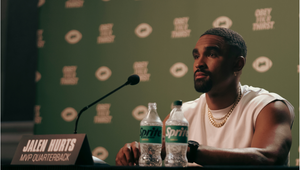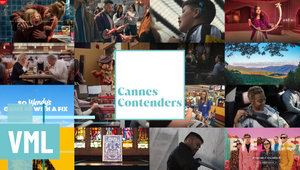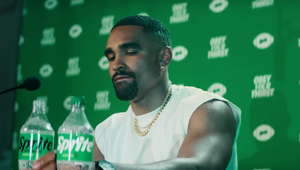
Amy Worley and the Front Lines of Social Media

As the global chief connections officer at VML, Amy Worley leads a team of experts in social and influencer, media, search, PR and experiential marketing. Together they help clients across all industries navigate today’s complex marketing landscape to reach their business goals.
LBB> What’s the most significant development or trend shaping the social space right now?
Amy> It would be easy to say AI here… and it wouldn’t be wrong!
But, I’d rather talk about the move toward closed communities. More and more, people are seeking out spaces like Discord servers, niche subreddits, and Facebook Groups where they can engage in conversations around shared interests, away from the performative pressures of mainstream feeds. (This also includes a rise in the use of ‘hobby apps’ like Strava, Goodreads, and Letterboxd. Just look at the comments in the New York Times Cooking app!).
I think people are craving more authenticity and genuine connection, and are becoming more discerning about how they invest their time and attention online.
With that in mind, some of the brands we work with have seized this trend by launching their own closed communities, like the Wendy's Discord server catering to superfans.
LBB> Every platform functions so differently — and the way they function evolves over time and there’s a lot of fun to be had on social, from shoppable livestreams to AI filters — so where are you finding the most satisfying or exciting creative opportunities right now (and can you give an example of a campaign that demonstrates that)?
Amy> For me, it always comes back to exceptional community management. When we craft experiences that make a brand feel like a genuine member of a community, not just an advertiser, that’s the magic of social media.
Audible has built an entire community within the ‘#BookTok’ subculture, not just by publishing great content on its own TikTok, but by engaging deep in the comments about specific books and the in-jokes and fandoms around them. It's a high-effort, high-credibility approach that really works.
LBB> Social media is a space for brands to be a bit more human — but how do you walk the line between personable and twee?
Amy> The key is self-awareness. Brands need to deeply understand their own identity, values, and target audience. What makes them unique? What do they stand for? What are they against?
Generic snarkiness is not only a recipe for cringe, but you also run out of things to say quickly if all you're focused on is the sound of a brand voice and not the values that underpin it. A brand that consistently talks and behaves in alignment with its brand essence can be incredibly powerful. That consistency and humanity builds familiarity and trust over time, and that’s what a strong brand is all about!
LBB> What does “craft” mean to you in a social context?
Amy> Craft in social is about being so fluent in the unique language and norms of the community, and so familiar with the mechanisms of each platform, that a brand can exist in that social world just like the persona it aims to embody.
LBB> Organic, paid, influencers, social search — how do you approach figuring out the best way to reach audiences?
Amy> One of the beauties of social media lies in its versatility. It's a full-funnel marketing powerhouse, capable of building brand awareness, driving consideration, generating leads and commerce, and fostering long-term loyalty.
The value we bring as social experts is our ability to combine data about audience behaviours with deep expertise about social platforms and our clients’ business goals. We put that together to craft a custom strategy that uses the perfect mix of organic content, paid advertising, influencer partnerships, and social search optimisation. It's not about choosing one over the other; it's about creating an ecosystem that drives results.
LBB> Social media can be brutal — on a personal level, how do you deal with that aspect of the role and helping your teams on the front line?
Amy> I hope people really appreciate the social strategists and community managers of the world! It's a tough job being on the front lines of social media all day, facing negativity, trolls, and constant scrutiny.
At VML we’re so lucky to have a very large social team, and they have their own internal group chat where they share POVs, help each other solve problems, and commiserate on the issues of the day. They support each other, give each other virtual hugs, and make each other laugh. I really feel for community managers who are not surrounded by people who empathise with what their day is like. That could be a tough and lonely place.
LBB> Social media has been accused of driving polarisation and spreading misinformation, while others call it the marketplace of ideas. Whether or not that’s the whole truth, it is certainly shaping discourse and is one of the key venues for culture war-ish behaviour. What’s your take on the role of social media in society and what responsibilities do brands and individuals working in social have?
Amy> Social media can be a cesspool of misinformation and hate. It’s also a place where someone who feels isolated can find community. Social media makes it easy to bully and troll… and it’s also saved lives, both through individual connections and through the ability for whole oppressed communities to be heard.
It would be amazing if social platforms could enable the beauty of connection while blocking the hate, but even when they try (and they don’t always try), it’s pretty much impossible. At the end of the day, as creators and consumers of information, we all have a responsibility to be critical thinkers, to question what we see and read, to avoid spreading harmful content and misinformation, and to treat each other with respect. And, we have to take care of our own mental health.
LBB> What are the biggest missteps you see brands making most regularly on social media?
Amy> The biggest mistake is a lack of strategic clarity. Brands sometimes jump into social media without a clear understanding of their identity, values, and target audience. They end up posting generic content with no distinct personality, hoping to appeal to everyone but ultimately resonating with no one. Before entering the chat, brands need to do the work of defining their persona, identifying their unique story – what they fight for and what is the enemy – and understanding their audience's passion points. This strategic foundation pays off.
LBB> Inevitable AI question! How are you applying AI in your day-to-day role, and what have been your key insights/observations about the best way to approach it in the campaigns you’ve worked on (feel free to share examples)?
Amy> We're leveraging AI-powered tools for things like content planning, audience analysis, and analysing social listening data to identify emerging trends before they pop. We use brand-specific agents to draft copy or create versions of a social content assets. We take a human-first approach and then use technology as a tool. Leveraging AI for the routine and usual aspects of social marketing helps the humans stay focused on the new and unusual, of which there is a lot!
LBB> Thinking longer term, where do you see the biggest risks and opportunities when it comes to AI in social?
Amy> In my most dystopian moments, I envision a future where feeds are overrun by AI-generated avatars hawking products and misinformation. It’s a place with very little humanity, and I try not to dwell there!
On the bright side, I think AI could take on some of the more menial tasks associated with our work, like building out content calendars, drafting production briefs, and organising reams of data into themes. Then, we humans have more time to empathise, ideate, collaborate, and build what’s next.
LBB> When you’re not working, what social platforms and content do you personally enjoy engaging with and why? What creators, influencers, and social communities do you really love?
Amy> Twitter was home base for me for so many years, and I’m still heartbroken that it’s gone. I’m on all the ‘Twitter replacement’ apps, and I’m holding out hope, but, at this point, none of them have the scale or community that Twitter had in its prime. I currently spend most of my scrolling time on Instagram and TikTok. Reddit is also a go-to search engine and source for so many things.
The content I gravitate toward most falls into two categories: learning and dogs/animals. I’m kind of addicted to learning – how things work, science, history, culture. On Instagram, for example, I follow @frontoffice.co. Yes, it’s a brand that sells clothing, but you’ll almost never see that in his Instagram videos. Rather, he delves into things like Japanese aesthetics, the history of heritage menswear brands, and how that influences fabric choices and design. I love that stuff.
As for animal content, I know @simonsits has gotten a lot of celebrity shoutouts recently, but I’ve been following Isabel since her days with @thedogist. I love watching each of the dogs she fosters heal and thrive, and then get adopted. One of the great things about the internet is that, no matter how many dog videos you watch, there will always be more. It keeps me going!
LBB> What advice would you give to people who are looking to get into social, whether as creatives, strategists, or producers?
Amy> Social media is a constantly evolving landscape, and it’s impossible to imagine what the space will look like in the future. The job you start with is almost certainly not the job you’ll have in 10 years, or even two years. If that excites you and if you’re a person who is curious, collaborative, and who loves to learn new things, it’s a great place to keep your fingers on the pulse of what’s happening in culture.















